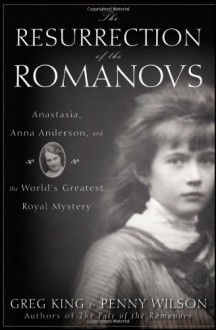
The author states in his introduction, "there is really no new evidence here." What a statement!! Mr. King goes through the entire case, from the grand beginnings in the Palaces of Russia and a family seeminly living in paradise, detours through imprisonment and the shattered lives ended in a basement, to the one person who seemed to walk away from it all with just a few visible scars.
Anna Anderson was the one person who brought the entire world almost to a stand still. Her claim to be the Grand Duchess Anastasia, the youngest daughter of the Tsar of Russia. She almost seemed bored with the entire proceeding, of having to proclaim over and over again that she was who she claimed to be. Many were taken aback by her apparent lack of care over proving her identity. The major question though is why did she not want to see certain people, how did she manage to pull the charade out for so long, and why were so many people willing to believe she was who she was claiming to be. The answer simply comes down to the fact that after the war, people were desperate. They wanted to reclaim a part of their glorious past, and perhaps if she really was who she claimed, there would be large rewards for them as well. Anderson had something of a natural charm that drew people to her. She could push them away as she was temperamental and suspected everyone of trying to take advantage of her.
In the end, DNA was able to prove what no one else could, that Anderson was NOT the Grand Duchess Anastatia. Anderson had lived with the lie for so long that she even convinced herself of the role. She built each layer so carefully, so precise, that by the end, if she has walked away, she could have opened herself to legal persecution. It was easier to live with the lie than it was to face the truth, the real person that she was. The lie was more engaging, and she was appreciated and wanted. The life Anderson led before was one of hardship, unwanted by her mother, and anonymity that would get her no where. She wanted more from life, and the executions and rumors that swarmed around the possibility that there might be a surviving daughter gave Anderson the light she needed to move forward to a new life.
I think this was a good read,full of information, BUT there were several instances where the reader will get bogged down with details so boring, with the information that seems to be on repeat... a lot. If you want to get a read comprehensive review of the entire case from pre to after without reading any other material, then this would be the book you would want to read.


 Log in with Facebook
Log in with Facebook 







